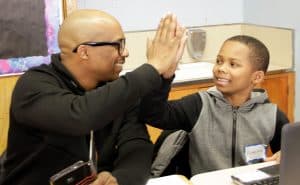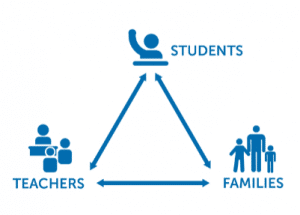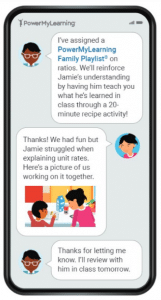PowerMyLearning: Tools for Culturally Responsive Partnering with Families During Hybrid/Remote Learning and Beyond
CompetencyWorks Blog
 Our country is in the midst of a reckoning around racial injustice and is also navigating a once-in-a-century pandemic. For school leaders who are seeking to ensure an equitable and inclusive response to these forces, bringing families into the learning process with compassion and purpose is a top priority.
Our country is in the midst of a reckoning around racial injustice and is also navigating a once-in-a-century pandemic. For school leaders who are seeking to ensure an equitable and inclusive response to these forces, bringing families into the learning process with compassion and purpose is a top priority.
 At PowerMyLearning, a national nonprofit organization, we strive to create equitable learning experiences for students by supporting teachers and families. We’ve been doing this work for over 20 years and our key insight is that students do best when the trio of students, families, and teachers collaborate on the same learning goals—we call this approach the “triangle of learning relationships.” And we believe this approach is needed now more than ever, especially with distance and hybrid learning becoming the norm across the country for this school year.
At PowerMyLearning, a national nonprofit organization, we strive to create equitable learning experiences for students by supporting teachers and families. We’ve been doing this work for over 20 years and our key insight is that students do best when the trio of students, families, and teachers collaborate on the same learning goals—we call this approach the “triangle of learning relationships.” And we believe this approach is needed now more than ever, especially with distance and hybrid learning becoming the norm across the country for this school year.
We recently published a revision our Framework for Teachers to better reflect our commitment to developing a strong triangle of learning relationships across all learning environments. We started working on this revision long before the pandemic, and have found that our Framework is especially resonant with school leaders and teachers during this time because it integrates families into teacher practice in a way that actually makes teachers’ work easier and their practice stronger.
Using the Framework, teachers learn how to authentically partner with families across four domains: Learning Environment, Instructional Planning and Delivery, Data-Driven Decision Making, and Student Agency. Each domain describes the best research-based strategies that teachers can put into practice both with students and with families. The practices included are rooted in the work of Karen Mapp, and the writings on Culturally Responsive Teaching by Zaretta Hammond, Geneva Gay, and others.
The Framework is grounded in the following core concepts from the research literature:
- Equity: All students have the capacity to engage in rigorous learning—regardless of race, gender, learning differences, socio-economic status, or background. Students need to feel safe, respected, and valued in order to learn.
- Family Engagement: Families are essential partners who want success for their children and can be invaluable assets to student learning. With strong communication and trust in place, all families can provide unique insight to teachers, help students set and work toward goals, and support ongoing learning and exploration at home.
- Social-Emotional Learning: To succeed in school and beyond, students need support developing their social-emotional skills, including opportunities at school and at home to drive their own learning, set and work towards goals, reflect, apply feedback, and collaborate with others.
- Culturally Responsive Teaching: All students benefit from seeing a diversity of cultures and ideas reflected in instruction and in their classroom environment, and from engaging in rigorous, personalized learning that connects academic concepts to their lived experiences.
We support the Framework by providing professional development (PD) via online workshops, coaching, and Professional Learning Communities. We are seeing tremendous interest in these offerings during the pandemic since we can help teachers improve their practices during distance/hybrid learning and involve families in the learning process with compassion and purpose.
The Framework and our PD are not the only tools we have in our toolbox. Our innovation called Family Playlists enables teachers to activate the entire triangle. Family Playlists® are fun learning assignments that can be delivered via cell phone in 100+ languages.
 You’ve probably heard the old adage “you only learn something when you teach it to someone else.” Family Playlists leverage the protégé effect (aka learning by teaching) by having students teach a family member about what they are learning in class. After completing an offline activity at home (like building a molecule with toothpicks and gummies), the family member sends feedback about the activity (including photos) to the teacher. The teacher can then respond to that message in the family partner’s home language.
You’ve probably heard the old adage “you only learn something when you teach it to someone else.” Family Playlists leverage the protégé effect (aka learning by teaching) by having students teach a family member about what they are learning in class. After completing an offline activity at home (like building a molecule with toothpicks and gummies), the family member sends feedback about the activity (including photos) to the teacher. The teacher can then respond to that message in the family partner’s home language.
Teachers love to see their students become leaders and guide their parents through what they are learning in class. Plus the innovation works across all learning environments: distance, hybrid, and in-person. Since the pandemic started, we’ve seen a tripling of usage from schools and districts nationwide.
Ms. Moak, a fifth grade science teacher, said: “Family Playlists have students apply what they learn in class to their real lives. My students are starting to realize that science is not just what you learn in a book—it’s all around! This is a great way to assign science homework that doesn’t actually seem like homework—it’s a fun family activity.”
The Family Playlist that is a personal favorite of Ms. Moak’s is the one where students had to look around their house and find examples of energy transfer, applying the concept to their real lives. Examples they found included a blender converting electrical energy to sound energy, and a toaster converting electrical energy into thermal energy.
Feedback from parents included photos and comments such as:
- “I loved this activity. It refreshed my memory and motivated my child to investigate.”
- “I learned something new myself. It’s really fun to see what my child is doing in school.”
- “This was a creative activity in which my child was able to learn hands-on. It also gave insight on what she’s doing in Science class. Please provide the students with additional homework like this one.”
These interactions support positive teacher-family relationships, which ultimately drive student outcomes. A recent study found that Family Playlists had a statistically significant impact on students’ New York State math scores equivalent to four months of additional learning.
Family Playlists are available for math, science, and ELA in grades K–8. They are aligned to Common Core math and ELA standards and Next Generation Science Standards.
Interested in learning more?
- Download our Framework
- Learn more about PowerMyLearning’s PD offerings
- Learn more about Family Playlists
- View our recent Aurora Institute webinar and slide deck, which I co-presented along with PowerMyLearning’s Emily Amick and Maryell Hernández
- Twitter: https://twitter.com/PowerMyLearning, @PowerMyLearning
- Facebook: https://www.facebook.com/PowerMyLearning/
- YouTube: https://www.youtube.com/user/PowerMyLearning
 Elisabeth Stock is CEO and Co-Founder of PowerMyLearning, which she built from a nascent non-profit in 1999 into a national leader in advancing educational equity in the K-12 learning space. Elisabeth is a Pahara-Aspen Education Fellow and a life-long Ashoka fellow. She has given a TEDx talk and high-level briefings at the White House and the U.S. Department of Education, and she has served as an advisor to the NYC Department of Education. Elisabeth served as a White House Fellow in the Office of the Vice President, where her experience as the principal architect of a government-wide education technology program led her to launch PowerMyLearning a year later. Elisabeth served as a member of the MIT Board of Trustees (1997-2002) and is the youngest individual ever to be appointed to the MIT Executive Committee (2000-2002). Elisabeth has earned four degrees from MIT.
Elisabeth Stock is CEO and Co-Founder of PowerMyLearning, which she built from a nascent non-profit in 1999 into a national leader in advancing educational equity in the K-12 learning space. Elisabeth is a Pahara-Aspen Education Fellow and a life-long Ashoka fellow. She has given a TEDx talk and high-level briefings at the White House and the U.S. Department of Education, and she has served as an advisor to the NYC Department of Education. Elisabeth served as a White House Fellow in the Office of the Vice President, where her experience as the principal architect of a government-wide education technology program led her to launch PowerMyLearning a year later. Elisabeth served as a member of the MIT Board of Trustees (1997-2002) and is the youngest individual ever to be appointed to the MIT Executive Committee (2000-2002). Elisabeth has earned four degrees from MIT.